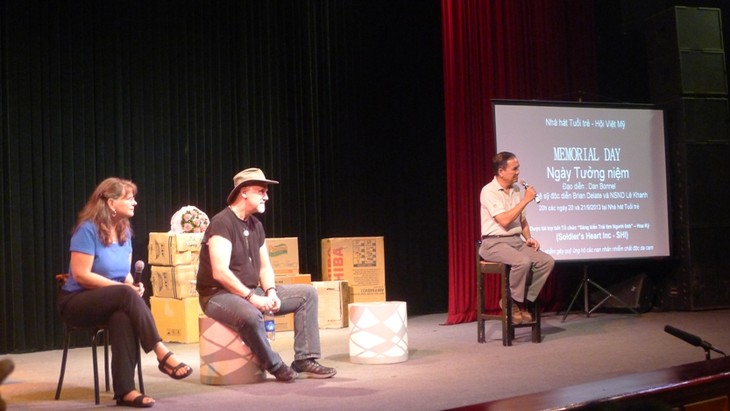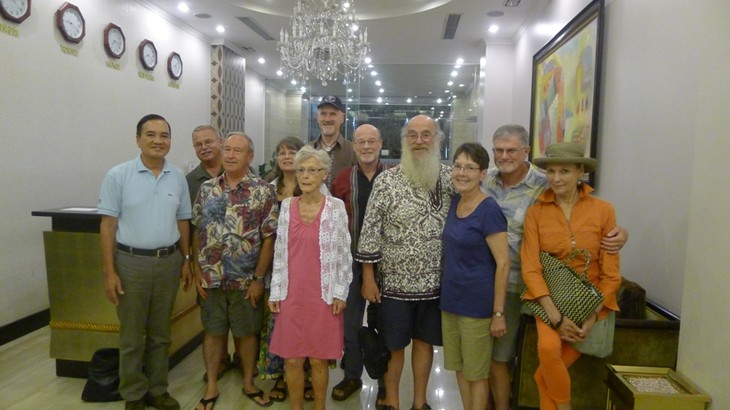(VOVworld) - 40 years since the end of the Vietnam war, many American war veterans haven’t been able to find peace of mind. They have been struggling with Post-traumatic Stress Disorder (PTSD). Although the US possesses the most advanced healthcare system in the world, modern medical equipment and hospitals are not enough to help remove their obsessions of the war in Vietnam. This wound in their souls needs mental therapy, which can be found only in the land where they fought. The journey of American war veterans back to Vietnam to find peace of mind is an emotional and humane story. Let’s find out more through a report called “Obsession with war and mental therapy” by Lan Anh.
The story takes place in the night before Memorial Day in a small apartment in New York. Brian Dalate plays the role of veteran Brest Westmoreland, who is in the room, preparing to kill himself. Rapid-fire, haunting and intimidating memories drive the character to the verge of suicide, too shoot to pull the trigger. He thinks of the acquaintances he made in Vietnam, and the horrific scenes of troops scurrying on the ground, of helicopters, burning, destroying, chasing, and shooting. These are the highlights of the play “Memorial Day”, whose director and main character is Brian Dalate.

Brian talks to the audience after the play
|
The play delivers to the Vietnamese audience a perspective on the inner world of Brest Westmoreland, an American war veteran who fought in Vietnam and is struggling with posttraumatic stress disorder (PTSD), a mental disease suffered by many American veterans. The play’s main character echoes the author’s own life, a draftee infantry sergeant in the Vietnam War. He was stationed in the central province of Quang Ngai from 1969 to 1970. “Well, when I first came home as I described in the play, it was a mess. There was a lot of violence, a lot of fear. I didn’t know who to trust, I didn’t know where my life was going. And I could not reclaim what I had left, it was gone. The memories were put away for a long time. On September 11, I witnessed a plane going into the trade center. It basically brought it all back to the surface”.
The Vietnam-US Society, the Soldier’s Heart Initiative (SHI) organization and the Youth Theater sponsored the “Memorial Day” project to relieve the fear and worries in the minds of US war veterans and to raise funds for Vietnamese Agent Orange/dioxin victims. Vietnamese People’s Artist Le Khanh plays a ghost who witnesses the character’s inner struggle: “We have been cooperating with many art troupes and individuals. When I met Brian and got to know his play, I realized that it is not an ordinary art work but a bridge. It is a bridge to help erase the painful past and to open a new path in the future.”

SHI members on a trip to Vietnam
|
Poet, doctor Edward Tick, who co-founded and heads the SHI organization, said only healing the war wounds of the US and Vietnam will help war veterans recover from posttraumatic stress disorder: “I realized a long time ago that ordinary counseling and psychological therapy is not enough to heal the terrible wounds of war and certainly the heavy use of medications by psychiatrists does not heal the wounds. So we wanted to find a best possible way to bring healing first to Americans honestly and I thought the best possible thing we could do is have Americans meet the Vietnamese and find out who you really are and learn to turn former enemies, people they fear into friends”.
Edward’s thinking and actions have proven effective. Since 2004, he has joined many delegations of US war veterans and their relatives to visit Vietnam, contributing significantly to reconciliation efforts between the two countries. These meaningful activities have helped American veterans relax their minds. Edward said: “14 years, we have built a school in the Mekong delta and we have built 6 or 7 compassion houses. We have given water buffaloes and cows to poor farmers and fishermen. We gave a heating and hard water system to the Rosy Jade humanity center. We have adopted a daughter and we have helped the Agent Orange orphanage in Hung Yen province. We’ve built a library in Kim Dong school in Quang Nam province. We also repaired the schools after the typhoon and the Da Nang school. We’ve given toilet facilities and repaired the building after the typhoon damage.”
Howerd Harrison used to be a military medic in the US Airborne Division which was stationed in Binh Dinh from 1967 to 1968. Howerd returns to Vietnam after 45 years and wants to visit the place where he was stationed and where his friends died. He comes back to Vietnam with his wife Barbara: “One of my goals with my wife Barbara was to get closest as I could to where my buddy and other medics died and make some sort of memorial and as we arrived at Bang Son, we stopped for a direction, this time, a gentleman gave us some more directions of a very small road and we proceeded. We found the old runway, the airstrip and not long after we arrived there, the gentleman who gave us the direction came up on his moped and to make sure that we found it and he identified himself as an NVA sapper. After I had been there I believed he was later injured when the NVA overran LG English.”
Howerd felt warmth when meeting this soldier of the Vietnam’s people’s army. His regrets were all gone with just a friendly handshake: “I’m really touched and honored that there’s been such reconciliation from everyone over here. I’ve just felt nothing but love, appreciation for Americans coming back. It’s been wonderful to be able to make a contribution. We wanted to do something special, we arranged that we could donate a cow, it’s Barbara’s idea. That’s one of the donations we did and it was named Barb after Barbara, my wife. That was really fun. I feel real strong and loving connection with this country now.”
The smile on Howerd’s face and the peace in his mind gave Barbara more love and strength. After many years living together, she understands his regrets about the war in Vietnam: “First of all, Song said that this is not going to be a vacation, a journey of exhilaration. I was overwhelmed with all the warmth and through Song and his efforts and everyone else here that Howerd could come to some resolutions about how we felt about the war. My family has always worked for peace and we campaigned against the war here in Vietnam and we’re stilling working for peace. It’s important for Harry to come back and for him to work through this grief that he had about what he had done here and about his friend that was killed here. Because of all the wonderful people that we’ve met and been with and sang with and had joy with, I never had a bad thought about Vietnam but the warmth that we received here just made this a wonderful journey and I really appreciate that.”
Veteran William, who fought in the Buon Me Thuot battlefield from 1968 to 1969, has been living with war obsessions for 45 years. Like Howerd, he returns to Vietnam to visit his former battlefield and find himself again: “There was a particular obsession where children and we had to remove the children after they were burned. That’s really sad for me. It’s a paradox because the children looked at me happy when I was in Vietnam the first time. There was also a situation where a rocket blew up about 15 feet from me and made me deaf for a while. It was very disturbing when I was going to sleep at night. These are the two biggest things that I find disturbing in my memories. Returning here just excites me and a friend or part of SHI like their involvement in what they’ve done with compassion houses and schools and things of animals, things of that nature. That’s more height in the Agent Orange folks and I have Agent Orange myself. We’re all brothers and sisters on the planet and this is a good return for me.”
History of war in either Vietnam or any other place in the world has indicated that both the winner and the loser suffer losses and grievances. Solving the consequences of war needs long-term cooperation from both sides. The tolerance and benevolence of the Vietnamese people have helped Howerd, William or any other American veteran find peace of mind. Edward says he wants both nations to reconcile to contribute to a peaceful world: “So this is the truth, they can heal more in 2 or 3 weeks coming back to Vietnam than in 40 years since the war using medicine You help us heal our psychological and spiritual wounds and we help you heal the physical wounds so together we make one people working together to heal everybody’s war wounds.”
Nearly half a century, the American soldiers, who devastated Vietnam, return here in the hope for tolerance, friendly looks, and warm smiles to help them rid obsessions of war. Vietnamese people have gone beyond hostilities to give them a valuable mental therapy and a lesson about tolerance and compassion./.